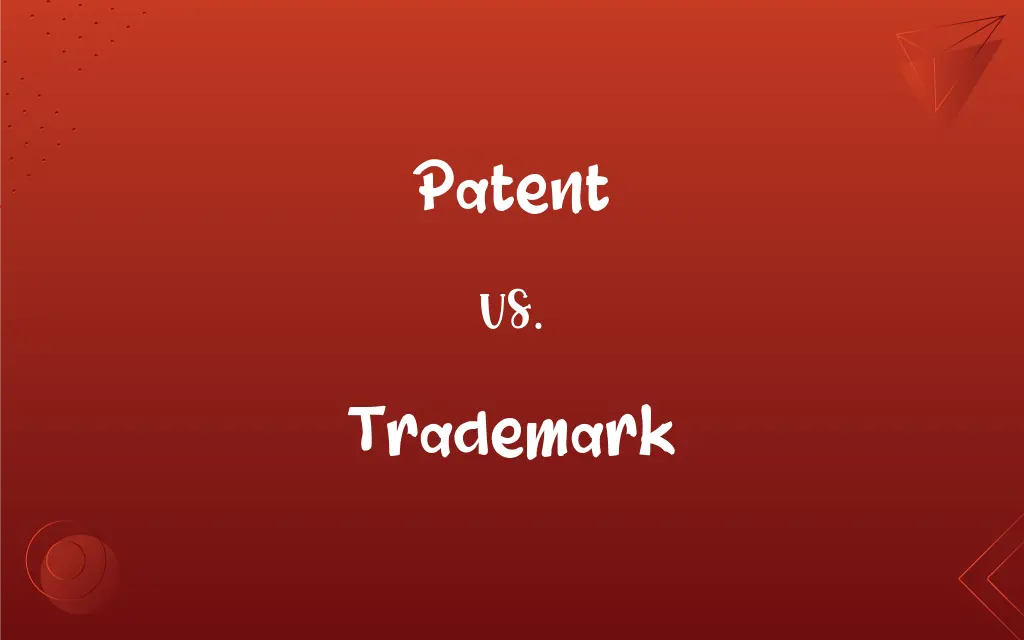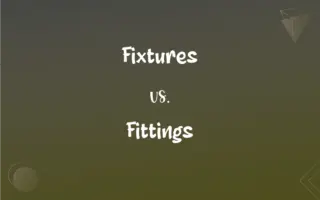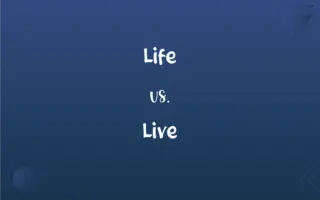Patent vs. Trademark: What's the Difference?
Edited by Aimie Carlson || By Janet White || Updated on November 18, 2023
A Patent protects inventions; a Trademark identifies the source of goods/services.

Key Differences
A Patent refers to the exclusive right granted to an inventor to protect their invention from being made, sold, or used by others for a certain period of time. This means that for a designated time, the inventor has the sole right to benefit from their creation.
On the other hand, a Trademark is a sign capable of distinguishing the goods or services of one enterprise from those of other enterprises. While Patents guard the functional aspects of products and processes, Trademarks protect brand names, logos, symbols, and other identifying features that represent goods or services in the marketplace.
Both Patents and Trademarks are essential components of intellectual property law, serving different purposes. While a Patent might cover a new technology or process, a Trademark covers anything that represents a particular brand.
In essence, while Patents protect the functional form of a product, Trademarks safeguard its distinctive identity.
Comparison Chart
Nature
Protection of inventions
Protection of brand identity
ADVERTISEMENT
Duration
Typically 20 years
Can be renewed indefinitely
What it Protects
Functionality
Brand names, logos, slogans
Registration
Patent Office
Trademark Office
Renewal
Not renewable (generally)
Must be renewed periodically
Patent and Trademark Definitions
Patent
A government license conferring a right for a set period.
She was granted a Patent for her new invention.
ADVERTISEMENT
Trademark
A symbol, word, or words representing a company or product.
The golden arches are a Trademark of McDonald's.
Patent
Exclusive rights to an inventor to produce or sell an invention.
He secured a Patent for his new software algorithm.
Trademark
A brand officially registered and legally protected.
She successfully defended her Trademark against infringement.
Patent
Evident or obvious.
The reason for his anger was Patent to everyone in the room.
Trademark
A distinguishing characteristic or feature.
His sense of humor was a Trademark that everyone recognized.
Patent
A document granting such rights.
She proudly displayed her Patent certificate on the wall.
Trademark
A recognizable emblem or symbol.
The swoosh is the Trademark of Nike.
Patent
A grant made by a government that confers upon the creator of an invention the sole right to make, use, and sell that invention for a set period of time.
Trademark
Legal protection for brand names and logos.
They registered their business name as a Trademark.
Patent
Letters patent.
Trademark
Abbr. TM A name, symbol, or other device used to identify and promote a product or service, especially an officially registered name or symbol that is thereby protected against use by others.
Patent
An invention protected by such a grant.
Trademark
A distinctive characteristic by which a person or thing comes to be known
The snicker that became the comedian's trademark.
Patent
A grant of publicly owned land, particularly to a homesteader.
Trademark
To label (a product) with proprietary identification.
Patent
The official document of such a grant.
Trademark
To register (something) as a trademark.
Patent
The land so granted.
Trademark
A word, symbol, or phrase used to identify a particular company's product and differentiate it from other companies' products.
Patent
An exclusive right or title.
Trademark
Any proprietary business, product or service name.
Patent
Protected or conferred by a patent or letters patent
A patent right.
Trademark
The aspect for which someone or something is best known; a hallmark or typical characteristic.
Patent
Of, relating to, or dealing in patents
Patent law.
Trademark
(proscribed) To register something as a trademark.
Patent
(also pātnt) Obvious; plain
A patent injustice.
Trademark
(proscribed) To so label a product.
Patent
Not blocked; open
A patent duct.
Trademark
(informal) Distinctive, characteristic, signature.
Patent
Spreading open; expanded
Patent sepals.
Trademark
A distinctive characteristic or attribute
Patent
Relating to or being a nonprescription drug or other medical preparation that is protected by a trademark.
Trademark
A formally registered symbol identifying the manufacturer or distributor of a product
Patent
Of high quality. Used of flour.
Patent
To obtain a patent on or for (an invention, for example).
Patent
To invent, originate, or be the proprietor of (an idea, for example).
Patent
To grant a patent to or for.
Patent
(law)
Patent
An official document granting an appointment, privilege, or right, or some property or title; letters patent.
Patent
(specifically)
Patent
A specific grant of ownership of a piece of real property; a land patent.
Patent
(by extension) A product in respect of which a patent (sense 1.2.2) has been obtained.
Patent
(uncountable) shoes]]
Patent
(figuratively)
Patent
A licence or (formal) permission to do something.
Patent
A characteristic or quality that one possesses; in particular (hyperbolic) as if exclusively; a monopoly.
Patent
(gambling) The combination of seven bets on three selections, offering a return even if only one bet comes in.
Patent
To (successfully) register (a new invention) with a government agency to obtain the sole privilege of its manufacture, sale, and use for a specified period.
Patent
To obtain (over a piece of real property) a specific grant of ownership.
Patent
To be closely associated or identified with (something); to monopolize.
Patent
Conspicuous; open; unconcealed.
Patent
(baking) Of flour: fine, and consisting mostly of the inner part of the endosperm of the grain from which it is milled.
Patent
(medicine) Open, unobstructed; specifically, especially of the ductus arteriosus or foramen ovale in the heart, having not closed as would have happened in normal development.
She has a patent ductus arteriosus that will require surgery to close.
Patent
Of an infection: in the phase when the organism causing it can be detected by clinical tests.
Patent
Explicit and obvious.
Those claims are patent nonsense.
Patent
(archaic)
Patent
Especially of a document conferring some privilege or right: open to public perusal or use.
Letters patent
Patent
Appointed or conferred by letters patent.
Patent
(botany) Of a branch, leaf, etc.: outspread; also, spreading at right angles to the axis.
Patent
(law) Protected by a legal patent.
A patent right
Patent medicines
Patent
To which someone has, or seems to have, a claim or an exclusive claim; also, inventive or particularly suited for.
Patent
Open; expanded; evident; apparent; unconcealed; manifest; public; conspicuous.
He had received instructions, both patent and secret.
Patent
Open to public perusal; - said of a document conferring some right or privilege; as, letters patent. See Letters patent, under 3d Letter.
Patent
Appropriated or protected by letters patent; secured by official authority to the exclusive possession, control, and disposal of some person or party; patented; as, a patent right; patent medicines.
Madder . . . in King Charles the First's time, was made a patent commodity.
Patent
Spreading; forming a nearly right angle with the steam or branch; as, a patent leaf.
Patent
A letter patent, or letters patent; an official document, issued by a sovereign power, conferring a right or privilege on some person or party.
Four other gentlemen of quality remained mentioned in that patent.
Patent
The right or privilege conferred by such a document; hence, figuratively, a right, privilege, or license of the nature of a patent.
If you are so fond over her iniquity, give her patent to offend.
Patent
To grant by patent; to make the subject of a patent; to secure or protect by patent; as, to patent an invention; to patent public lands.
Patent
A document granting an inventor sole rights to an invention
Patent
An official document granting a right or privilege
Patent
Obtain a patent for;
Should I patent this invention?
Patent
Grant rights to; grant a patent for
Patent
Make open to sight or notice;
His behavior has patented an embarrassing fact about him
Patent
(of a bodily tube or passageway) open; affording free passage;
Patent ductus arteriosus
Patent
Clearly apparent or obvious to the mind or senses;
The effects of the drought are apparent to anyone who sees the parched fields
Evident hostility
Manifest disapproval
Patent advantages
Made his meaning plain
It is plain that he is no reactionary
In plain view
Patent
A new method, apparatus, or process.
His Patent introduced a groundbreaking way to harvest solar energy.
FAQs
What is a Patent?
A Patent is a government-granted right that gives inventors exclusive rights to their invention for a set period, usually 20 years.
How long does a Patent last?
Typically, a Patent lasts for 20 years from the filing date.
Can I Trademark my invention?
No, inventions are protected by Patents, while brand identifiers like names and logos are Trademarked.
Who registers Trademarks?
Trademarks are registered with the government's Trademark Office.
What is a Trademark?
A Trademark is a symbol, name, or phrase used to identify and protect a brand or product.
Can I Patent a brand name?
No, brand names are protected by Trademarks, not Patents.
Can I sell my Patent?
Yes, Patents can be sold, licensed, or transferred.
Is a Patent valid worldwide?
No, a Patent is territorial and is only valid in the country where it's granted.
Who grants Patents?
Patents are granted by the government's Patent Office.
Can I Patent a business method?
In some jurisdictions, business methods can be Patented if they meet all Patentability requirements.
How long does a Trademark last?
A Trademark can last indefinitely, as long as it's renewed periodically.
What happens if my Patent expires?
Once a Patent expires, the invention becomes public domain and can be used freely by anyone.
Can I Trademark a sound or color?
Yes, distinctive sounds or colors associated with a brand can be Trademarked in certain circumstances.
Is a Trademark valid globally?
No, a Trademark is territorial, but there are international agreements that facilitate global Trademark protection.
How do I know if my invention is Patentable?
An invention must be novel, non-obvious, and useful to be Patentable.
How do I know if my brand name is Trademarkable?
A name should be unique, non-generic, and not likely to be confused with existing Trademarks to be Trademarkable.
Can software be Patented?
Yes, in many jurisdictions, software can be Patented if it meets certain criteria.
What happens if I don't renew my Trademark?
If not renewed, a Trademark can lapse and others might use or register it.
Can I license my Trademark to another company?
Yes, you can license your Trademark to others while maintaining ownership.
Can a slogan be Trademarked?
Yes, slogans that identify and distinguish a brand can be Trademarked.
About Author
Written by
Janet WhiteJanet White has been an esteemed writer and blogger for Difference Wiki. Holding a Master's degree in Science and Medical Journalism from the prestigious Boston University, she has consistently demonstrated her expertise and passion for her field. When she's not immersed in her work, Janet relishes her time exercising, delving into a good book, and cherishing moments with friends and family.
Edited by
Aimie CarlsonAimie Carlson, holding a master's degree in English literature, is a fervent English language enthusiast. She lends her writing talents to Difference Wiki, a prominent website that specializes in comparisons, offering readers insightful analyses that both captivate and inform.






































































